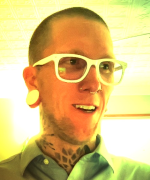
Why I Use the Good, the Bad, and the Ugly to Market My Practice
By Ryan McLaughlin
I love “real talk” on social media.
One recent post was about my kid vomiting in the car seat on the way home from swim lessons when it’s 10-below outside. The next post is about the defining elements of the first 5 minutes of my mediation practice.
Shouldn’t social media content strictly funnel toward business? How would a video of me sipping kombucha, eating peanut M&M’s, and talking about parenting challenges in the parking lot of Target add value for clients?
Why do this at all? Why mix personal and professional?
All great questions. Unfortunately, I only have anecdotal data.
Some context: before practicing law, I went to graduate school for creative writing. I focused on non-fiction. I think the messiness of humans is beautiful. The contradictions, imperfections, and amazing oscillations between.
What’s ‘Real Talk’?
I talk publicly on social media about a smattering of non-legal topics like sobriety, parenting, marriage, stress, and self-image. For example:
Parenting. Among other things, I struggle with the shift from workworkwork lawyering to play-laugh-dad. I forget that connection should proceed correction, and often lapse into punishment: “If you pull your sister by her sweatshirt hood again, no chocolate.” My wife sends me Dr. Becky videos and other parenting tips nightly.
Marriage. I have a scarcity mindset with money, tend to micro-manage, and this compounds my catastrophizing tendency. We all have our things, and this is one of mine. I’m working on this in weekly DBT group therapy—which is often one of my week’s highlights.
Self-Image. Since high school, I’ve lamented my lack of facial hair. As an adult, I still wish I could join no shave November in a meaningful way and grow a large lumberjack facial mane.
You’ll notice the above are self-deprecating. They are not self-congratulatory announcement posts about a new raise, new promotion, new publication. I think vulnerability is sexy. And redeeming. And people, if they give it a chance, are drawn to it.
I’m moved by the truth that underneath my proverbial (and sometimes literal) suit and tie, I’m a complicated and evolving human being like everybody else. I want to embrace this. I find and feel it to be psychologically salvific.
This is also a conscious marketing approach. In 2018, I started practicing and hung my own shingle. At that time, it had been 6 years since law school, and I hadn’t really participated in the legal world since. I had worked as a barista, a baker, a line cook, a high school English teacher, a Thai massage therapist, et cetera. I had no local legal world colleagues or contacts. So, I built a business on Facebook through authenticity. Authenticity has become a buzzword, but I think the concept is tied to humanity, courage, forgiveness, honesty, mistakes, love, trust, humility, hypocrisy, contradiction, judgment, etc. I make mistakes. I’m not perfect. And as such, my social media isn’t a highlight reel.
Lawyering with Humanity
When I was approached about writing this piece, the word “candor” was used. I was asked to write about candor, social media, and legal practice. “Human” seems like an earthier alternative to “candor,” and I like this word better. Like: what does it mean to be more human in your social media? This is also a meta inquiry. That is, I believe the inquiry applies far more broadly to our profession than merely social media.
I recently attended the Ramsey County Family Court Bench and Bar luncheon panel. I ate chocolate chip cookies. In the courtroom. Without sanctions.
No, but seriously, this casual lunch was the least intimidated I’ve been in a courtroom. It felt so good. There were raw moments during the luncheon that couldn’t have happened in a formal setting: reaching for the same sandwich, stitching in a joke after an awkward silence. I noticed that those were the moments I felt connected—to other people and myself.
Myrna McCallum, the keynote speaker at this spring’s Family Law Institute, is the host of “The Trauma-Informed Lawyer” podcast. Her thesis was huge, and impossible to recap here, but I want to show the connection between real talk and a larger restorative justice approach to law and justice. In short, McCallum’s thesis is that, culturally and professionally, we have shut ourselves off to our own humanity. Our style of relation is intended to shield us from criticism, from being perceived as imperfect...or human.
While we might seem more put-together, there are consequences to that shielding: disconnection, from ourselves and from each other. This causes stress in our bodies and minds, and that stress has grown so heavy we are finally unable to proceed forward without addressing it.
Embracing our own humanity and the humanity of others creates space for communication and conversation without so much fear of punishment or shame. Showing my humanity through my social media is a small way that I push back against the disconnection inherent in professionalism. I want to move towards the legal practice McCallum outlines: one grounded in forgiveness, of self and others.
Marketing with the Purple Cow Theory
Sure, part of me worries that my approach erodes professional respect. I worry about eye rolls, from both clients and colleagues. But, on the other hand, I subscribe to Seth Godin’s ‘purple cow’ theory. Basically, in a sea of black and white cows, you want to be purple. You’ll get noticed. And that’s the goal of marketing. If people hear you talking about how you spent 17 minutes this morning vacuuming cat hair off a baby car seat, they can identify. Then trust. This is how it works for me, at least.
I wanted to elaborate on the purple cow theory of getting noticed by adding authenticity and accessibility to my social media presence. Because the legal profession—with its formality and legalese—is so intimidating to the general public, I wanted to innovate by making myself more accessible, more normal. For example, initially I wore a suit and tie in my social media videos. Over time, I dropped more and more attire-formality. Occasionally, I will still dress up to make content. Mostly, though, I stay in the clothes I picked out that morning.
If you are interested, and curious, and want to make content: you can do it! I recently led a lunch and learn for the Collaborative Law Institute on social media—particularly Instagram and how to generate beautiful captions. The technological how-to portion of the talk took approximately 7 minutes. Instagram and TikTok and Facebook reels are doable. Try something. If it doesn’t feel good, pivot. What feels true to you? The frequency of posts, topic, tone, etc. It’s all up to you. You can do it!
Andrew Stickel, a law firm marketing expert, encourages lawyers ad nauseam to hold their phone up to their face and start talking. Take a selfie-style video of you talking. About anything. Don’t worry about the lighting. Don’t worry about the 3-day old pimple on your neck. Don’t worry about business casual or shirt and tie. Just do it. Make the video. Share the video. Repeat.
Lots of love. Embrace your purple cow.

Ryan McLaughlin is a lawyer pursuing the calling of a full-time mediation practice. Trained in transformative mediation, he draws from both his prior experience as a family law attorney and interest in multi-disciplinary approaches to conflict resolution. As such, he is especially deft in handling highly emotional situations. He has three daughters under 6 and loves half-caf au laits from the Dunn Bros on Grand Ave.